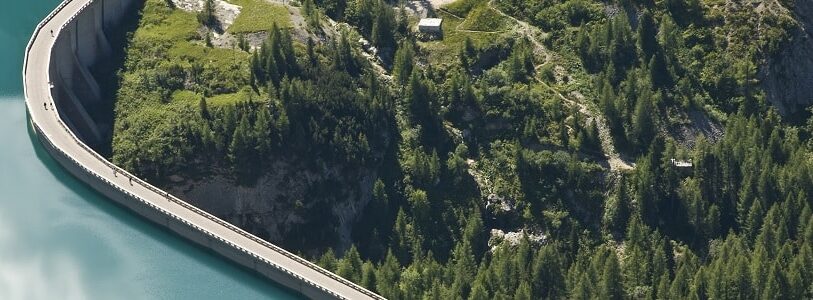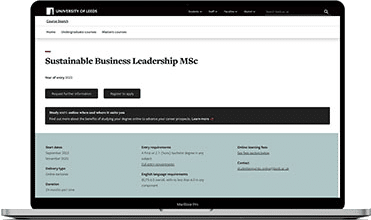Meet the Associate Professor for Sustainable Business Leadership
Sustainable Business Leadership
Dr James Van Alstine is an Associate Professor in Environmental Policy and the Director of Masters Education within the School of Earth and Environment, heavily involved with the delivery of the online Sustainable Business Leadership Masters / Postgraduate Certificate (PGCert). With around fifteen years of experience teaching sustainability at the University of Leeds, he is an expert in his field with a particular passion for environmental and climate policy and governance.
In this Q&A, we speak to James about his experience, research interests, the benefits of studying the course, faculty partnerships and more.
Learn more about our Sustainable Business Leadership courseQ: Firstly, please, could you just begin by introducing yourself?
A: My name is Dr James Van Alstine, and I’m an Associate Professor in Environmental Policy and the Director of Masters Education within the School of Earth and Environment at the University of Leeds.
Q: Could you tell us a little bit more about your experience? How did you get to where you are today?
A: So, I studied a Masters degree in London in the early 2000s, which led to a PhD that focused on how and why the downstream oil and gas sector started to improve their environmental performance in post-apartheid South Africa. Essentially, I was looking at how oil refineries were improving their environmental performance in a context without regulation. That was quite interesting, and it led me to look at the role of other factors that really influence business and sustainability, such as how communities, environmental justice activists or international norms and practices may influence large multinational companies.
That also led me to study the environmental governance of oil, gas, and mining operations in sub-Saharan Africa, particularly in less developed countries in sub-Saharan Africa. So, then I started working with communities that live in the regions where oil and minerals are being mined and produced.
That’s the journey where I started my work on sustainability and business and where it’s headed now is around the climate emergency transition, both in the context of the Global North and the Global South. In the Global South, we’re looking at what I say is the politics of norm such as high carbon energy extraction versus low carbon climate mitigation strategies. So, are African countries, for example, going to be allowed or enabled to extract fossil fuels, or will they be trying to leapfrog that stage of industrial development to implement renewables and what international support will that take? I’m looking at their climate goals, their nationally determined contributions to reducing emissions and trying to work with stakeholders to achieve those aims and objectives.
I’m really looking at the policy and governance around that. And here in the Global North, I’m working in the UK on net-zero strategies. I’m working with a team here in the School of Earth and Environment on creating geo solutions and using the subsurface to help de-carbonise our energy systems.
Q: And why sustainability, where does your passion for this subject stem from?
A: Sustainability means many things to many people. It really provides a very useful starting point for interdisciplinary research as well as a great starting point to explore various dimensions for very challenging policy problems.
My passion is trying to find multi-stakeholder solutions to real world problems and I find the framing around sustainability means that we can use a common language between, say, local communities, local governments, businesses, et cetera to try to understand their various views of that and then co-produce solutions through participation and by bringing groups and stakeholders together to create a common language around sustainability. Sustainability is a useful framework to bring those various stakeholders together.
Q: What would you say is your main area of expertise in sustainability? And do you have any particular research interests?
A: I place myself, and my research interests within the broad field of environmental and climate policy and governance with a focus on the extractive industry. So, I tend to focus on sustainability and the oil, gas, and mining sectors.
That has strong synergies with various aspects of policy and politics and governance, particularly around energy and climate governance. So, I mentioned before around sustainability that I’m quite interested in bringing organisations and individuals together from various sectors to create research-led solutions. So, when a piece of research is commissioned, we look at that together to try to understand how the outcomes from that research can influence the decision-making processes around energy, climate and more. This is typically dominated by experts, so trying to raise non-expert voices into these processes is important and that’s how I try to apply my research and solve some of these complex issues.
Uncover some of the top research projects at the School of Earth and EnvironmentQ: Could you tell us a bit more about the programme? What does it involve and who’s it for?
A: I think it’s a fantastic opportunity for individuals that are looking to either transition into the fields of business and sustainability or those who want to upskill in more sustainable leadership roles within their existing organisations.
It’s taught over 24 months and there’s three core foundation modules which are broadly within the field of sustainability and business, followed by six development modules which are more around the business skills side of it, which is exactly what employers want. There’s also a project module so students can choose to tailor the degree and move in the direction that they’re interested in and the field or discipline that they want to study further. If they want to further their career, they’re able to tailor the degree in that direction and, given that the assessment allows a reasonable scope for topic selection, it tends to be quite applied, enabling students to tailor the programme in various directions.
Learn more about the online Sustainable Business Leadership courseQ: And the course is taught fully online – what’s that like and how much interaction do you have with the students?
A: My involvement has been with the first three foundational modules and in my experience, it’s been a really great opportunity for interaction with the students through various types of online tools such as discussion boards, peer engagement and moderation with the module leaders. There are also weekly webinars where we check in with students, have discussions around certain topics and answer any specific questions. Then there are of course tutorials where students can meet with module leaders and other academic staff members. So, there’s a range of opportunities for students to engage with staff.
Find out more about the benefits of online learning with the University of LeedsQ: What are you hoping for students to get out of the course as a whole?
A: For me, it really depends on the student. In a couple of my interactions with students so far, there’s the mid-career student that’s perhaps looking at opportunities for career switching or moving their career in different directions. And for me, I really hope the course propels them to move into that next stage of their career.
Secondly, there’s those just getting started in their careers or maybe working within an organisation and for them, I hope it upskills them for promotion or movement latterly within their organisation. And as I mentioned before, I think through the applied project and the various types of assessments that the students will undertake, it allows them to really tailor the programme to the direction of travel with their careers.
Q: Why did you choose to join the University of Leeds?
A: The University of Leeds is a fantastic university. It’s a research leader in its field and within and across the University we often work strongly together, so working on challenges such as delivering student education or trying to engage in our research in an interdisciplinary manner. For example, the Sustainable Business Leadership programme is taught between the Business School and the School of Earth and Environment, whilst working alongside the Digital Education Service for the online component, and it’s a fantastic partnership.
I also work on other programmes where we’re working across different schools and faculties within the University and being able to do that has been fantastic. I find my colleagues here are fantastic. I’ve really enjoyed working here for almost fifteen years, so it keeps me coming back for more.
Discover the global reputation of the University of LeedsQ: What’s it like being a part of the School of Earth and Environment?
A: I’d say that the School of Earth and Environment is an interesting school. It’s almost like a microcosm of the University of Leeds, with five different research institutes spanning sustainability, climate sciences and atmospheric sciences as well as earth sciences, geosciences, and geophysics and tectonics. So, we have an interesting mix of the natural sciences and social sciences. Like I was saying on the university scale, it feeds down at the school level and it’s a fantastic place to work in an interdisciplinary manner.
I’m working with colleagues in various institutes and in other faculties to develop a geo solution centre for the University where we’re looking at using resources in the subsurface, like geothermal resources, to help solve the climate crisis and achieve our net-zero goals. You can’t do that alone, so you must work with engineers, academics in the business school, geoscientists, and other stakeholders to try and develop new business models for these resources. So, it’s a great place to sit in terms of being able to have access to these various disciplines.
Find out more about the School of Earth and EnvironmentQ: What are the faculty partnerships like and how do you think they benefit the course?
A: So, we have a variety of different partnerships which go in so many different directions, and very strong partnerships with local governments where we’re working with city councils, and regional entities as well.
Much of my work is on energy climate policy and governance, which is about trying to achieve net zero, particularly in the UK. I mentioned previously, I’ve worked quite extensively in sub-Saharan Africa, so we’ve worked with national and local governments there as well around various aspects of energy and climate security, but also to identify better ways to implement environmental management. We have very strong partnerships at the local and national government levels, and equally strong partnerships at the industry level with various organisations, charities, and NGOs.
Many of our former graduates are working in these organisations across the world, but we have many different partnerships to be able to support projects and enable students to work directly with consultancies and various organisations. I’ve coordinated collaborations between students and organisations on certain projects, and then our students often go and immerse themselves in those organisations because of the strong partnerships, both in industries and governments nationally and internationally.
Q: Could you give us a bit of a flavour of some of the kinds of companies and roles that graduates of the course go into?
A: Through some of our consultancy programmes within the School of Earth and Environment there really are many Leeds graduates in various environmental consultancies around the world, and this is just within my field of sustainability and business.
If we look at the other aspects of the School of Earth and Environment as well, whether it be climate sciences or geosciences, you’ll find many of our graduates in major companies as well as industry organisations, such as the Met Office, the Environment Agency, business, energy and industrial strategy organisations, UK government bodies and even the United Nations. I tend to work with international students that come to do programmes where they experience work within government departments and then go back to them after graduating.
They’re fantastic resources and networks to maintain and to bring them into the classroom as well through our online programmes. And getting some former students of ours that now work for the government to come back and present to students is also interesting. It’s a constant revolving door to some extent, but it’s fantastic to maintain those relationships.
Read more about the top five management careers in sustainabilityQ: If you could give one piece of advice to someone considering studying Sustainable Business Leadership with the University of Leeds, what would it be?
A: I’d say really have your world views and beliefs challenged through understanding how both internal and external factors might affect business and sustainability, whether it’s really understanding the power of regulation in government policy and how that can be an important lever to pull to achieve certain goals. Then of course, be ready to put tools to work to potentially provide applied solutions to those complex and challenging sustainability and climate issues that we face today.
Discover 6 reasons to study Sustainable Business Leadership
Did you enjoy this blog? Here’s some related sustainability content you may be interested in:

Want to learn more about our online Sustainable Business Leadership course?
Check out the course content and how to apply.

